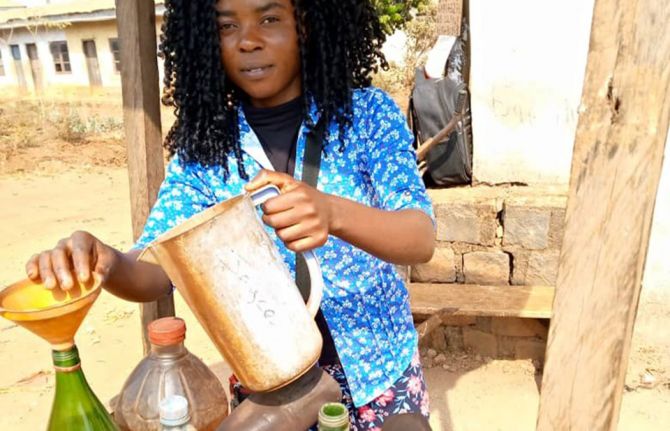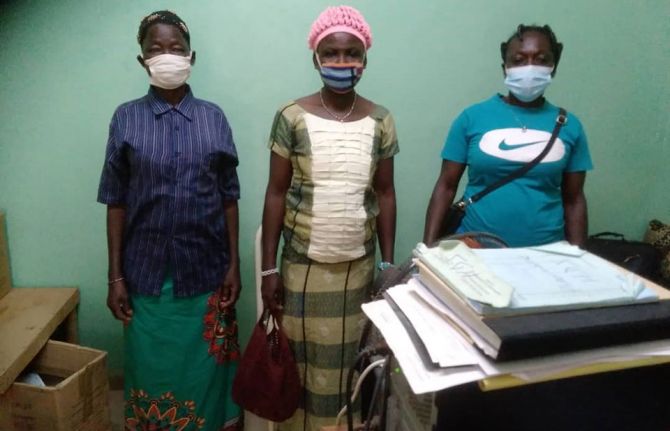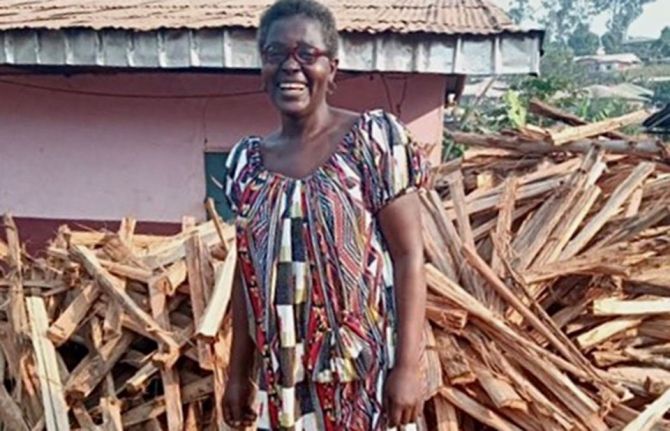



Feature Story
Getting unconditional cash to marginalized households during COVID-19
29 October 2021
29 October 2021 29 October 2021COVID-19 has underscored the crucial need for pandemic responses to include social protection measures that reach and benefit marginalized populations.
As the pandemic swept across western and central Africa in early 2020, the region was already grappling with socioeconomic distress and humanitarian crises. Social restrictions imposed to contain the pandemic exacerbated those challenges. Impoverished and vulnerable populations, including people living with HIV and key populations, were hit hard.
Surveys conducted between June and August 2020 in 17 countries in the region on the situation and needs of people living with HIV—with support from UNAIDS, in partnership with the Network of African People Living with HIV West Africa—revealed that up to 80% of people living with HIV were experiencing livelihood losses, and more than 50% of them needed financial and/or food assistance.
These findings convinced UNAIDS and the World Food Programme (WFP) to launch a pilot project on unrestricted cash transfers in July 2020 to help people living with HIV and key populations cope with the socioeconomic impact of HIV and COVID-19 in four priority countries: Burkina Faso, Cameroon, Côte d’Ivoire and Niger. The initiative was designed to capitalize on WFP’s existing arrangements with service providers and on UNAIDS’ community engagement and relationships with civil society networks in the four priority countries.
Cash transfers are increasingly recognized as an effective form of social protection, with positive social and economic effects. They provide income support and help households avoid selling off assets or removing children from school, and they have multiplier effects on local economies. They constituted approximately 40% of global social safety net expenditures in 2018, but less than 20% in western and central Africa.
As the pandemic spread across western and central Africa, only a few countries (Côte d’Ivoire and Senegal among them) allocated additional support for vulnerable households in the form of cash transfers or social grants.
The immediate objective of the pilot was to reach about 5000 households with one-off, unconditional cash transfers, which ranged from US$ 88 per beneficiary (in Côte d’Ivoire) to US$ 136 (in Cameroon).
“I am so grateful for this support. I used it to pay the fees for my sewing course and to buy a sewing machine to start my own business. I also helped my mother who lost her job due to the pandemic,” said a young woman living with HIV in Cameroon.
Civil society organizations and financial service providers were engaged during the planning of the pilot. Eligibility for the transfers was decided based on a variety of vulnerability criteria, and beneficiaries were identified with the support of community-led organizations. Additional steps involved sensitizing beneficiaries, distributing the cash transfers, troubleshooting and monitoring the process. Specific attention was made to ensure confidentiality and to mitigate any potential stigma for beneficiaries.
Across the four countries, almost 4000 beneficiaries were reached, and it is estimated that a further 19 000 household members also benefited from the cash transfers, most of which went towards food, health care, education and housing expenses, or for income-generating activities. Country experiences varied in terms of the depth of their collaboration with community partners and the extent to which government actors were involved.
The experience of the pilot demonstrated that delivering rapid cash transfers to marginalized people living with HIV and key populations in very difficult circumstances is possible, and that it provides valuable emergency support.
Critical lessons learned include the need for inclusive and flexible approaches, working in ways that are clear and transparent to community partners and systematically involving community partners throughout the process. Defining clear and unbiased eligibility criteria, applying them consistently and sensitizing beneficiaries and communities are also vital.
Capacity-building and other support (including funding) for community partners is another critical element. Community-level organizations, trusted counsellors and peer educators were essential for establishing trust, identifying and reaching the intended beneficiaries, minimizing stigma and assessing the impact of the cash transfers. Engaging with government structures from the beginning helps to create the potential for long-lasting improvements.
One-off cash transfers of this kind can help households withstand short-term shocks, but they do not do away with the need to fully integrate vulnerable and marginalized populations into crisis responses and comprehensive social protection systems. It is imperative that countries across Africa expand inclusive, multipurpose social protection that is accessible and sustainable. Enhancing the people-centredness of cash transfers and slotting them in with other forms of social provisioning and support that are not necessarily cash-based—such as free or subsidized primary health care, education, water and energy—is part of this process.
Following this pilot experience on the use of cash transfers to support the most vulnerable people living with HIV and key populations, UNAIDS and the Civil Society Institute for Health have further strengthened their collaboration on advancing HIV-sensitive and inclusive social protection in western and central Africa. Recently they organized, with the support of LUXDEV funding and in collaboration with several UNAIDS Cosponsors, a capacity-building workshop to mobilize and build the capacity of civil society and communities and to promote dialogue and collaboration among civil society organizations, partners and governments to advance inclusive, HIV-sensitive social protection in the region.
Building on the recommendations of the workshop, a number of follow-up activities were agreed to enhance the role and positioning of communities in advancing HIV-sensitive social protection within their countries and the region.
“The cash transfer initiative in Niger came at the right time. The cash transfers were used by the beneficiaries to stockpile food and pay rent, but most importantly to allow the children to continue their schooling. This initiative demonstrated the value and importance of working together with the communities and our Cosponsors to achieve a common goal,” said El Hadj Fah, the UNAIDS Country Director for Niger.



